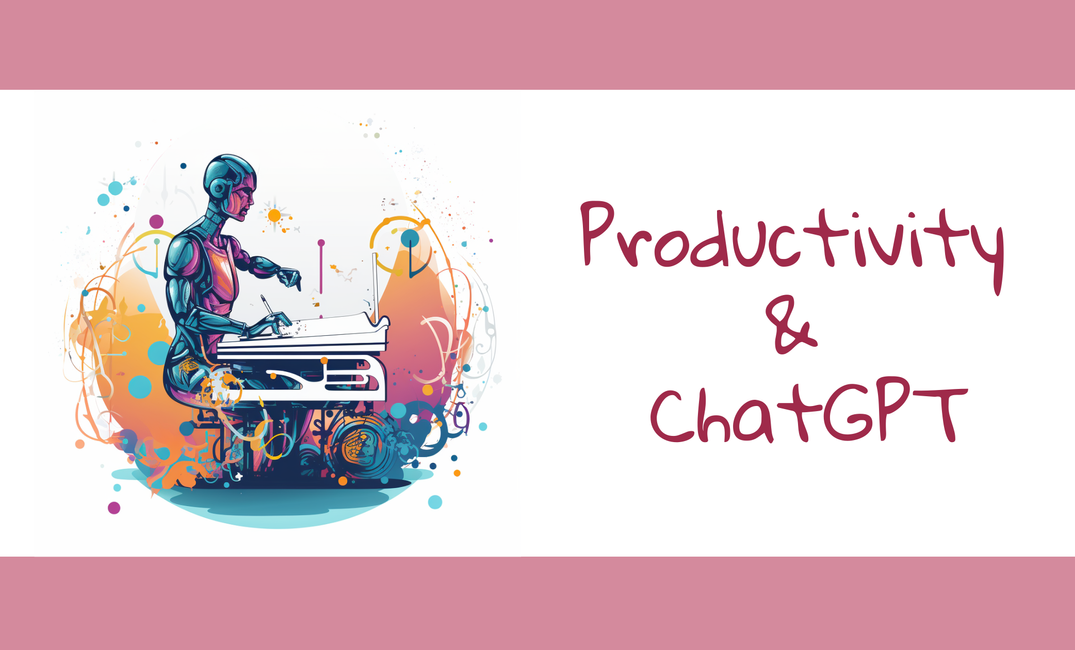Introduction
The new type of chatbot technology has pushed us into what feels like a new era. Even more so than blockchain, suddenly everyone is talking about generative AI and Chatbots like ChatGPT are transforming how we engage with work. They offer us improvements in efficiency, creativity, and precision like never before.
But with this technological evolution comes an imperative question: Will this technology replace or augment us? Let's dig into the evidence, explore the potential impacts, and weigh the ethical considerations of this groundbreaking technology.
How Chatbots are Influencing Productivity
With generative AI technology, tasks that once consumed hours can be performed in minutes. Imagine the amount of time saved by automating routine inquiries, data processing, or even content creation. But how much does it actually save us? To answer that question I did some digging and found a research article by Noy and Zhang titled ‘Experimental evidence on the productivity effects of generative artificial intelligence.’
They examined how the shift towards chatbot technology can be game-changing for midlevel professionals. Their results show that ChatGPT substantially increased productivity: The average time taken decreased by 40% and output quality rose by 18% (Noy & Zhang, 2023, p. 187). Not just that, it also leveled the playing field and made mid-range workers produce higher quality outputs.
It allows workers to focus on higher-level, more complex tasks, enhancing their value in the workplace.
The undeniable efficiency chatbots provide isn't merely about saving time; it's about elevating the role of midlevel professionals.
This shift doesn't just benefit the professionals themselves; it benefits organisations as a whole. It leads to more engaged employees, increased innovation, and potential growth.
Augmentation or Replacement?
The question of whether chatbots will replace or augment professionals is a heated debate. Some argue that chatbots are a threat to jobs, while others see them as an enhancement to human capability.
The fear of job loss is real, especially with advancements in AI and machine learning. But it's worth examining whether this fear is substantiated by the reality of how chatbots are actually being used.
While automation will change the nature of work, it's more likely to augment human intelligence rather than replace it outright. Chatbots can handle repetitive tasks, but they lack the nuanced understanding, creativity, and empathy that human professionals bring.
Rather than replacing us, chatbots appear to be augmenting our capabilities, leading to a synergistic relationship between human intelligence and artificial assistance.
Emphasising augmentation over replacement promotes a future where technology and humanity work in harmony, fostering innovation, empathy, and growth.
Ethical Considerations
With the widespread adoption of chatbots, ethical considerations come to the forefront. How do we balance efficiency with integrity, automation with empathy?
As chatbots take over certain roles, concerns arise around data privacy, potential biases in algorithms, and the potential dehumanisation of customer interactions.
Recent research points to the importance of transparent algorithms and robust data protection measures in maintaining trust. Furthermore, maintaining a human touch in customer interactions ensures that empathy and understanding are not lost.
Therefore, the integration of chatbots must be handled with care, aligning technological advancements with ethical principles.
A thoughtful approach ensures that the productivity gains from chatbots doesn't come at the cost of ethical compromises and that trust and humanity in professional interactions is maintained.
Conclusion
The rise of chatbot technology, exemplified by tools like ChatGPT, presents an exciting frontier for all of us. While fears of replacement persist, the evidence leans towards augmentation, with chatbots enhancing human capabilities rather than usurping them. The key is to navigate this transformation with a keen eye on ethical considerations.
Your Action Items:
- Embrace chatbot technology as a tool for enhancing, not replacing you. Use it to help you think and not let it think for you. Create your own prompts and let the AI learn YOUR style and how you want it to help you to bring out the best in you.
- Stay informed about the ethical considerations and ensure responsible adoption.
- Engage with ongoing dialogues about the future of work and the role of AI in professional life.
If you want help to do that, let me know. I'm happy to help.
Until next time,
Regina
Sources:
Noy, S., & Zhang, W. (2023). Experimental evidence on the productivity effects of generative artificial intelligence. Science, 381(6654), 187–192. https://doi.org/10.1126/science.adh2586

